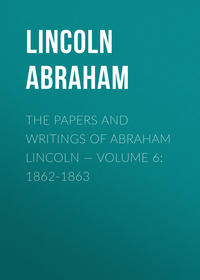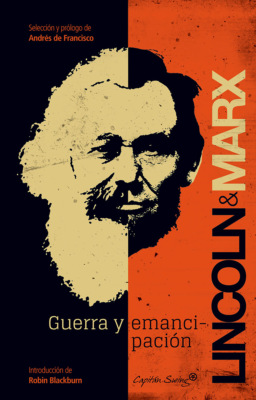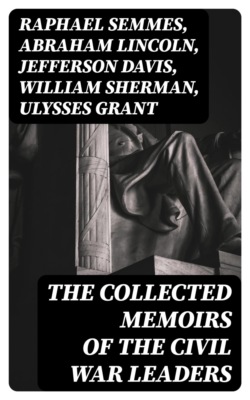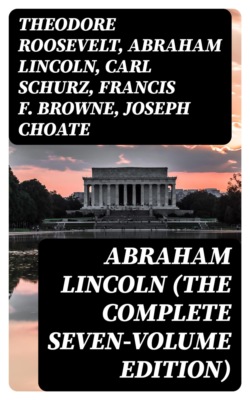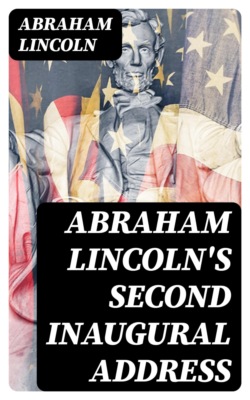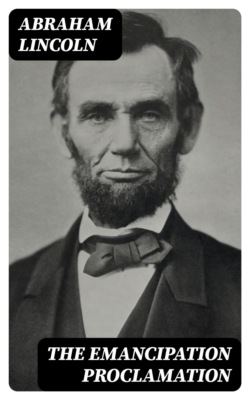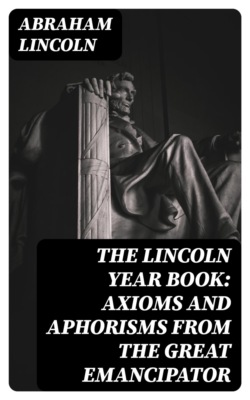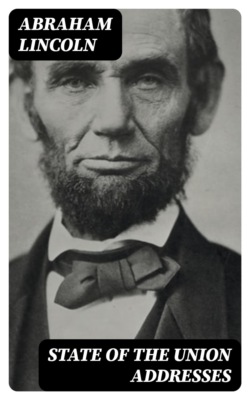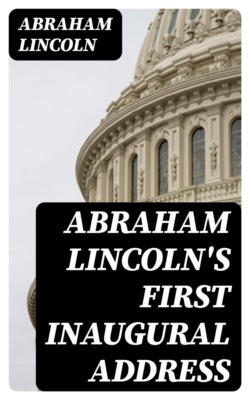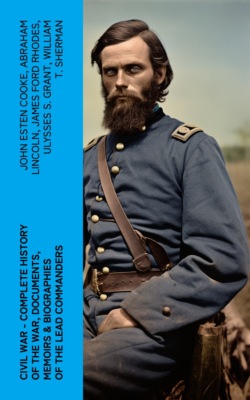Kitabı oku: «The Papers And Writings Of Abraham Lincoln — Volume 6: 1862-1863», sayfa 13
Fellow-citizens, we can not escape history. We of this Congress and this administration will be remembered in spite of ourselves. No personal significance or insignificance can spare one or another of us. The fiery trial through which we pass will light us down in honor or dishonor to the latest generation. We say we are for the Union. The world will not forget that we say this. We know how to save the Union. The world knows we do know how to save it. We, even we here, hold the power and bear the responsibility. In giving freedom to the slave we assure freedom to the free — honorable alike in what we give and what we preserve. We shall nobly save or meanly lose the last, best hope of earth. Other means may succeed; this could not fail. The way is plain, peaceful, generous, just — a way which if followed the world will forever applaud and God must forever bless.
A. LINCOLN.
MESSAGE TO CONGRESS
WASHINGTON, December 3, 1862
TO THE SENATE AND HOUSE OF REPRESENTATIVES:
On the 3d of November, 1861, a collision took place off the coast of Cuba between the United States war steamer San Jacinto and the French brig Jules et Marie, resulting in serious damage to the latter. The obligation of this Government to make amends therefor could not be questioned if the injury resulted from any fault On the part of the San Jacinto. With a view to ascertain this, the subject was referred to a commission of the United States and French naval officers at New York, with a naval officer of Italy as an arbiter. The conclusion arrived at was that the collision was occasioned by the failure of the San Jacinto seasonably to reverse her engine. It then became necessary to ascertain the amount of indemnification due to the injured party. The United States consul-general at Havana was consequently instructed to confer with the consul of France on this point, and they have determined that the sum of $9,500 is an equitable allowance under the circumstances.
I recommend an appropriation of this sum for the benefit of the owners of the Jules et Marie.
A copy of the letter of Mr. Shufeldt, the consul-general of the United States at Havana, to the Secretary of State on the subject is herewith transmitted.
A. LINCOLN.
TELEGRAM TO H. J. RAYMOND
EXECUTIVE MANSION, WASHINGTON,
December 7, 1862.
Hon. H. J. RAYMOND, Times Office, New York:
Yours of November 25 reached me only yesterday. Thank you for it. I shall consider and remember your suggestions.
A. LINCOLN.
TELEGRAM TO B. G. BROWN
EXECUTIVE MANSION, WASHINGTON December 7, 1862
HON. B. GRATZ BROWN, Saint Louis, Missouri:
Yours of the 3d received yesterday. Have already done what I can in the premises.
A. LINCOLN.
TELEGRAM TO GOVERNOR JOHNSON
EXECUTIVE MANSION, WASHINGTON, December 8, 1862. GOVERNOR ANDREW JOHNSON, Nashville, Tenn.:
Jesse H. Strickland is here asking authority to raise a regiment of Tennesseeans. Would you advise that the authority be given him?
A. LINCOLN.
MESSAGE TO CONGRESS. December 8, 1862
WASHINGTON, D. C
TO THE SENATE AND HOUSE OF REPRESENTATIVES:
In conformity to the law of July 16, 1862, I most cordially recommend, that Commander John L. Worden, United States Navy, receive a vote of thanks of Congress for the eminent skill and gallantry exhibited by him in the late remarkable battle between the United States ironclad steamer Monitor, under his command, and the rebel ironclad steamer Merrimac, in March last.
The thanks of Congress for his services on the occasion referred to were tendered by a resolution approved July 11, 1862, but the recommendation is now specially made in order to comply with the requirements of the ninth section of the act of July 16, 1862, which is in the following words, viz.:
"That any line officer of the navy or marine corps may be advanced one grade if upon recommendation of the President by name he receives the thanks of Congress for highly distinguished conduct in conflict with the enemy or for extraordinary heroism in the line of his profession."
A. LINCOLN.
TO GENERAL S. R. CURTIS
EXECUTIVE MANSION, WASHINGTON,
December 10, 1862.
MAJOR-GENERAL CURTIS, St. Louis, Missouri:
Please suspend, until further order, all proceeding on the order made by General Schofield, on the twenty-eighth day of August last, for assessing and collecting from secessionists and Southern sympathizers the sum of five hundred thousand dollars, etc., and in the meantime make out and send me a statement of facts pertinent to the question, together with your opinion upon it.
A. LINCOLN.
TO J. K. DUBOIS
EXECUTIVE MANSION, WASHINGTON,
December 10, 1862.
Hon. J. K. DuBois.
MY DEAR SIR: — In the summer of 1859, when Mr. Freeman visited Springfield, Illinois, in relation to the McCallister and Stebbins bonds I promised him that, upon certain conditions, I would ask members of the Legislature to give him a full and fair hearing of his case. I do not now remember, nor have I time to recall, exactly what the conditions were, nor whether they were completely performed; but there can be in no case any harm [in] his having a full and fair hearing, and I sincerely wish it may be given him.
Yours truly,
A. LINCOLN.
MESSAGE TO THE SENATE
December 11, 1862
TO THE SENATE OF THE UNITED STATES:
In compliance with your resolution of December 5, 1862, requesting the President "to furnish the Senate with all information in his possession touching the late Indian barbarities in the State of Minnesota, and also the evidence in his possession upon which some of the principal actors and head men were tried and condemned to death," I have the honor to state that on receipt of said resolution, I transmitted the same to the Secretary of the Interior, accompanied by a note, a copy of which is herewith inclosed, marked A, and in response to which I received, through that department, a letter of the Commissioner of Indian Affairs, a copy of which is herewith inclosed, marked B.
I further state that on the eighth day of November last I received a long telegraphic despatch from Major-General Pope, at St. Paul, Minnesota, simply announcing the names of the persons sentenced to be hanged. I immediately telegraphed to have transcripts of the records in all cases forwarded to me, which transcripts, however, did not reach me until two or three days before the present meeting of Congress. Meantime I received, through telegraphic despatches and otherwise, appeals in behalf of the condemned, appeals for their execution, and expressions of opinion as to the proper policy in regard to them and to the Indians generally in that vicinity, none of which, as I understand, falls within the scope of your inquiry. After the arrival of the transcripts of records, but before I had sufficient opportunity to examine them, I received a joint letter from one of the senators and two of the representatives from Minnesota, which contains some statements of fact not found in the records of the trials, and for which reason I herewith transmit a copy, marked C. I also, for the same reason, inclose a printed memorial of the citizens of St. Paul, addressed to me, and forwarded with the letter aforesaid.
Anxious to not act with so much clemency as to encourage another outbreak on the one hand, nor with so much severity as to be real cruelty on the other, I caused a careful examination of the records of trials to be made, in view of first ordering the execution of such as had been proved guilty of violating females. Contrary to my expectation, only two of this class were found. I then directed a further examination and a classification of all who were proven to have participated in massacres, as distinguished from participation in battles. This class numbered forty, and included the two convicted of female violation. One of the number is strongly recommended, by the commission which tried them, for commutation to ten years imprisonment I have ordered the other thirty-nine to be executed on Friday the 19th instant. The order was despatched from here on Monday, the 8th instant, by a messenger to General Sibley, and a copy of which order is herewith transmitted, marked D.
An abstract of the evidence as to the forty is herewith inclosed, marked E.
To avoid the immense amount of copying, I lay before the Senate the original transcripts of the records of trials, as received by me.
This is as full and complete a response to the resolution as it is in my power to make.
A. LINCOLN.
MESSAGE TO CONGRESS
December 12, 1862
FELLOW-CITIZENS OF THE SENATE AND HOUSE OF REPRESENTATIVES:
I have in my possession three valuable swords, formerly the property of General David E. Twiggs, which I now place at the disposal of Congress. They are forwarded to me from New Orleans by Major-General Benjamin F. Butler. If they or any of them shall be by Congress disposed of in reward or compliment of military service, I think General Butler is entitled to the first consideration. A copy of the General's letter to me accompanying the swords is herewith transmitted.
A. LINCOLN.
TO FERNANDO WOOD
EXECUTIVE MANSION, WASHINGTON DECEMBER 12, 1862
HON. FERNANDO WOOD.
MY DEAR SIR: — Your letter of the 8th, with the accompanying note of same date, was received yesterday. The most important paragraph in the letter, as I consider, is in these words:
"On the 25th of November last I was advised by an authority which I deemed likely to be well informed, as well as reliable and truthful, that the Southern States would send representatives to the next Congress, provided that a full and general amnesty should permit them to do so. No guarantee or terms were asked for other than the amnesty referred to."
I strongly suspect your information will prove to be groundless; nevertheless, I thank you for communicating it to me. Understanding the phrase in the paragraph just quoted — "the Southern States would send representatives to the next Congress" — to be substantially the same as that "the people of the Southern States would cease resistance, and would reinaugurate, submit to, and maintain the national authority within the limits of such States, under the Constitution of the United States," I say that in such case the war would cease on the part of the United States; and that if within a reasonable time "a full and general amnesty" were necessary to such end, it would not be withheld.
I do not think it would be proper now to communicate this, formally or informally, to the people of the Southern States. My belief is that they already know it; and when they choose, if ever, they can communicate with me unequivocally. Nor do I think it proper now to suspend military operations to try any experiment of negotiation.
I should nevertheless receive with great pleasure the exact information you now have, and also such other as you may in any way obtain. Such information might be more valuable before the 1st of January than afterwards.
While there is nothing in this letter which I shall dread to see in history, it is, perhaps, better for the present that its existence should not become public. I therefore have to request that you will regard it as confidential.
Your obedient servant,
A. LINCOLN.
TELEGRAM TO GENERAL CURTIS
EXECUTIVE MANSION, WASHINGTON, December 14, 1862
MAJOR-GENERAL CURTIS, St. Louis, Missouri:
If my friend Dr. William Fithian, of Danville, Ill., should call on YOU, please give him such facilities as you consistently can about recovering the remains of a step-son, and matters connected therewith.
A. LINCOLN.
TELEGRAM TO GENERAL H. H. SIBLEY
EXECUTIVE MANSION, WASHINGTON, December 16, 1862
BRIG. GEN. H. H. SIBLEY, Saint Paul, Minn.:
As you suggest, let the executions fixed for Friday the 19th instant be postponed to, and be done on, Friday the 26th instant.
A. LINCOLN. (Private.) Operator please send this very carefully and accurately. A. L.
TELEGRAM TO GENERAL CURTIS
EXECUTIVE MANSION, WASHINGTON, December 16, 1862
MAJOR-GENERAL CURTIS, Saint Louis, Missouri:
N. W. Watkins, of Jackson, Mo., (who is half brother to Henry Clay), writes me that a colonel of ours has driven him from his home at Jackson. Will you please look into the case and restore the old man to his home if the public interest will admit?
A. LINCOLN.
TELEGRAM TO GENERAL BURNSIDE
WAR DEPARTMENT, WASHINGTON CITY, D. C., December 16, 1862
MAJOR-GENERAL BURNSIDE, Falmouth:
Your despatch about General Stahel is received. Please ascertain from General Sigel and his old corps whether Stahel or Schurz is preferable and telegraph the result, and I will act immediately. After all I shall be governed by your preference.
A. LINCOLN.
TELEGRAM TO GENERAL CURTIS
EXECUTIVE MANSION, WASHINGTON, December 17, 1862
MAJOR-GENERAL CURTIS:
Could the civil authority be reintroduced into Missouri in lieu of the military to any extent, with advantage and safety?
A. LINCOLN.
TELEGRAM TO GENERAL BURNSIDE
EXECUTIVE MANSION, WASHINGTON, December 17, 1862
MAJOR-GENERAL BURNSIDE
George Patten says he was a classmate of yours and was in the same regiment of artillery. Have you a place you would like to put him in? And if so what is it?
A. LINCOLN.
TELEGRAM TO GOVERNOR GAMBLE
EXECUTIVE MANSION, WASHINGTON, December 18, 1862
GOVERNOR GAMBLE, Saint Louis, MO.:
It is represented to me that the enrolled militia alone would now maintain law and order in all the counties of your State north of the Missouri River. If so all other forces there might be removed south of the river, or out of the State. Please post yourself and give me your opinion upon the subject.
A. LINCOLN.
TELEGRAM TO GENERAL CURTIS
EXECUTIVE MANSION, WASHINGTON,
December 19, 1862.
MAJOR-GENERAL CURTIS, Saint Louis, Mo.:
Hon. W. A. Hall, member of Congress here, tells me, and Governor Gamble telegraphs me; that quiet can be maintained in all the counties north of the Missouri River by the enrolled militia. Confer with Governor Gamble and telegraph me.
A. LINCOLN.
TELEGRAM TO GENERAL A. E. BURNSIDE
WASHINGTON, December 19, 1862
MAJOR-GENERAL BURNSIDE:
Come, of course, if in your own judgment it is safe to do so.
A. LINCOLN.
TO SECRETARIES SEWARD AND CHASE
EXECUTIVE MANSION, WASHINGTON,
December 20, 1862.
HON. WILLIAM H. SEWARD AND HON. SALMON P. CHASE.
GENTLEMEN: — You have respectively tendered me your resignations as Secretary of State and Secretary of the Treasury of the United States. I am apprised of the circumstances which may render this course personally desirable to each of you; but after most anxious consideration my deliberate judgment is that the public interest does not admit of it. I therefore have to request that you will resume the duties of your departments respectively.
Your obedient servant,
A. LINCOLN.
TELEGRAM TO GOVERNOR ANDREW
WASHINGTON, D. C., December 20, 1862
GOVERNOR ANDREW, Boston, Mass.:
Neither the Secretary of War nor I know anything except what you tell us about the "published official document" you mention.
A. LINCOLN.
TO T. J. HENDERSON
EXECUTIVE MANSION, WASHINGTON, December 20, 1862
HON. T. J. HENDERSON.
DEAR SIR: — Your letter of the 8th to Hon. William Kellogg has just been shown me. You can scarcely overestimate the pleasure it would give me to oblige you, but nothing is operating so ruinously upon us everywhere as "absenteeism." It positively will not do for me to grant leaves of absence in cases not sufficient to procure them under the regular rules.
It would astonish you to know the extent of the evil of "absenteeism." We scarcely have more than half the men we are paying on the spot for service anywhere.
Yours very truly,
A. LINCOLN.
CONGRATULATIONS TO THE ARMY OF THE POTOMAC
EXECUTIVE MANSION, WASHINGTON,
December 22, 1862.
TO THE ARMY OF THE POTOMAC:
I have just read your general's report of the battle of Fredericksburg. Although you were not successful, the attempt was not an error, nor the failure other than accident. The courage with which you, in an open field, maintained the contest against an intrenched foe, and the consummate skill and success with which you crossed and recrossed the river in the face of the enemy, show that you possess all the qualities of a great army, which will yet give victory to the cause of the country and of popular government.
Condoling with the mourners for the dead, and sympathizing with the severely wounded, I congratulate you that the number of both is comparatively so small.
I tender to you, officers and soldiers, the thanks of the nation.
A. LINCOLN.
LETTER OF CONDOLENCE
TO MISS FANNY McCULLOUGH
EXECUTIVE MANSION, WASHINGTON, December, 23, 1862.
DEAR FANNY: — It is with deep regret that I learn of the death of your kind and brave father, and especially that it is affecting your young heart beyond what is common in such cases. In this sad world of ours sorrow comes to all, and to the young it comes with bittered agony because it takes them unawares.
The older have learned ever to expect it. I am anxious to afford some alleviation of your present distress, perfect relief is not possible, except with time. You cannot now realize that you will ever feel better. Is not this so? And yet it is a mistake. You are sure to be happy again. To know this, which is certainly true, will make you some less miserable now. I have had experience enough to know what I say, and you need only to believe it to feel better at once. The memory of your dear father, instead of an agony, will yet be a sad, sweet feeling in your heart, of a purer and holier sort than you have known before.
Please present my kind regards to your afflicted mother.
Your sincere friend,
A. LINCOLN.
TO SECRETARY OF WAR
EXECUTIVE MANSION, WASHINGTON, December 26, 1862
HONORABLE SECRETARY OF WAR.
Sir: — Two Ohio regiments and one Illinois regiment which were captured at Hartsville have been paroled and are now at Columbus, Ohio. This brings the Ohio regiments substantially to their homes. I am strongly impressed with the belief that the Illinois regiment better be sent to Illinois, where it will be recruited and put in good condition by the time they are exchanged so as to re-enter the service. They did not misbehave, as I am satisfied, so that they should receive no treatment nor have anything withheld from them by way of punishment.
Yours truly,
A. LINCOLN.
TELEGRAM TO GENERAL CURTIS
EXECUTIVE MANSION, WASHINGTON, December 27, 1862
MAJOR-GENERAL CURTIS, Saint Louis, Mo.:
Let the order in regard to Dr. McPheeters and family be suspended until you hear from me.
A. LINCOLN.
